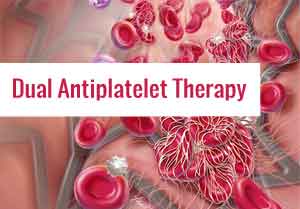- Home
- Editorial
- News
- Practice Guidelines
- Anesthesiology Guidelines
- Cancer Guidelines
- Cardiac Sciences Guidelines
- Critical Care Guidelines
- Dentistry Guidelines
- Dermatology Guidelines
- Diabetes and Endo Guidelines
- Diagnostics Guidelines
- ENT Guidelines
- Featured Practice Guidelines
- Gastroenterology Guidelines
- Geriatrics Guidelines
- Medicine Guidelines
- Nephrology Guidelines
- Neurosciences Guidelines
- Obs and Gynae Guidelines
- Ophthalmology Guidelines
- Orthopaedics Guidelines
- Paediatrics Guidelines
- Psychiatry Guidelines
- Pulmonology Guidelines
- Radiology Guidelines
- Surgery Guidelines
- Urology Guidelines
ESC / EACTS Focused Update on Dual Antiplatelet Therapy in CAD

The first ESC Focused Update on Dual Antiplatelet Therapy in Coronary Artery Disease has been developed by the Task Force for dual antiplatelet therapy in coronary artery disease of the European Society of Cardiology in collaboration with the European Association for Cardio-Thoracic Surgery (EACTS).The Guideline has been published in European Heart Journal.
Dual antiplatelet therapy (DAPT) has generated a lot of conflicting evidence and uncertainty in the medical community with respect to the optimal duration of DAPT after coronary stenting.Also lot of clarification is sought for DAPT in special circumstances like DAPT and percutaneous coronary intervention (PCI), DAPT and cardiac surgery, DAPT for patients with medical managed acute coronary syndrome (ACS), DAPT for patients with an indication for oral anticoagulation, elective non-cardiac surgery in patients on DAPT, and DAPT in specific populations including women, patients with diabetes mellitus, and patients who develop bleeding during treatment.The Guideline document has addressed most of issues which lurk in minds of most of the doctors.
Major recommendations:
- For ACS patients, the default DAPT duration should be 12 months, irrespective of the revascularization strategy (medical therapy, PCI or coronary artery bypass graft surgery [CABG]).
- Six months of DAPT should be considered in patients at high bleeding risk.
- Therapy longer than 12 months may be considered in ACS patients who have tolerated DAPT without a bleeding complication.
- The need for a short DAPT regimen should no longer justify the use of bare metal stents instead of newer generation drug-eluting stents (DES). DAPT duration should be guided by an assessment of the individual patient’s ischaemic versus bleeding risks and not by the stent type.
- Irrespective of the type of metallic stent implanted, the duration of DAPT in stable CAD patients treated with PCI should be one to six months depending on the bleeding risk. A longer DAPT duration may be considered in patients whose ischaemic risk is greater than the risk of bleeding.
- There is insufficient data to recommend DAPT in stable CAD patients treated with CABG.
- The addition of DAPT to oral anticoagulation therapy increases the risk of bleeding complications by two- to three-fold. The indication for oral anticoagulation should be reassessed and treatment continued only if there is a compelling indication such as atrial fibrillation, a mechanical heart valve, or recent history of recurrent deep venous thrombosis or pulmonary embolism.
- The duration of triple therapy (DAPT plus oral anticoagulation) should be limited to six months or omitted after hospital discharge depending on the ischaemic and bleeding risks.
- Clopidogrel is recommended as the default P2Y1,2 inhibitor in patients with stable CAD treated with PCI, patients with an indication for oral anticoagulation, and ACS patients in whom ticagrelor or prasugrel are contraindicated.
- Ticagrelor or prasugrel is recommended for ACS patients unless there are drug-specific contraindications. The decision on when to initiate a P2Y1,2 inhibitor depends on both the specific drug and the specific disease (stable CAD versus ACS).
- There is no difference in type and duration of DAPT therapy between male and female patients and for patients with and without diabetes mellitus.
For Further reference log on to : https://doi.org/10.1093/eurheartj/ehx638

Disclaimer: This site is primarily intended for healthcare professionals. Any content/information on this website does not replace the advice of medical and/or health professionals and should not be construed as medical/diagnostic advice/endorsement or prescription. Use of this site is subject to our terms of use, privacy policy, advertisement policy. © 2020 Minerva Medical Treatment Pvt Ltd